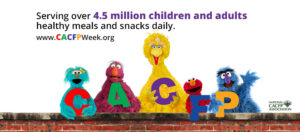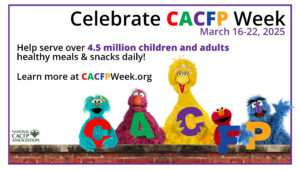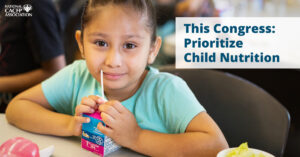Blog
Support a Proclamation for CACFP Week in Your State
National CACFP Week will be here before you know it! This year March 16-22 marks this national education campaign designed to raise awareness of the CACFP and its contribution to combating hunger. Ask Your Governor to Proclaim March 16-22, 2025 as National CACFP Week!
Read MoreQuarterly Policy Update: January 2025
The end of 2024 brought many changes and updates for the CACFP. USDA announced funding for child care to purchase local, released two requests for information, released seven pieces of guidance, published two studies.
Read MoreMeal Pattern Minute: Flavored Milk
Is there a sugar limit when serving flavored milk to ages 6 and older?
Read MoreGet Ready for CACFP Week 2025
Here are seven ways for you to celebrate with the CACFP community.
Read MoreChild Nutrition Should be Prioritized in 119th Congress
A new congress means there is an opportunity to push new priorities forward. Let your Representatives and Senators know that child nutrition is a priority for their constituents.
Read MoreJanuary Virtual Events
Check out these virtual events coming up this month at NCA!
Read MoreSFSP 2025 Reimbursement Rates
The USDA has released the SFSP reimbursement rates for 2025.
Read MoreMeal Pattern Minute: Seconds at At-Risk Afterschool Sites
Can second servings be reimbursed for at-risk afterschool programs?
Read MoreNon-Congregate Meal Service in Rural Areas: Q&A 3
This memo is the third set of questions and answers on the rural non-congregate summer meals option. The following operational topics are addressed in this guidance: Meal Service and Meal Quality; Civil Rights Requirements; Monitoring and Program Integrity; and General/Miscellaneous.
Read MoreUSDA Request for Information: Grain-Based Desserts & High-Protein Yogurt
On December 26, 2024, the USDA Food and Nutrition Service released a request for information (RFI) to help inform future policy, guidance, and technical assistance related to grain-based desserts and high-protein yogurt crediting in Child Nutrition Programs (CNPs). This is not a proposed rule, USDA is simply seeking additional information before moving forward with any rulemaking or future policy decisions.
Read More









